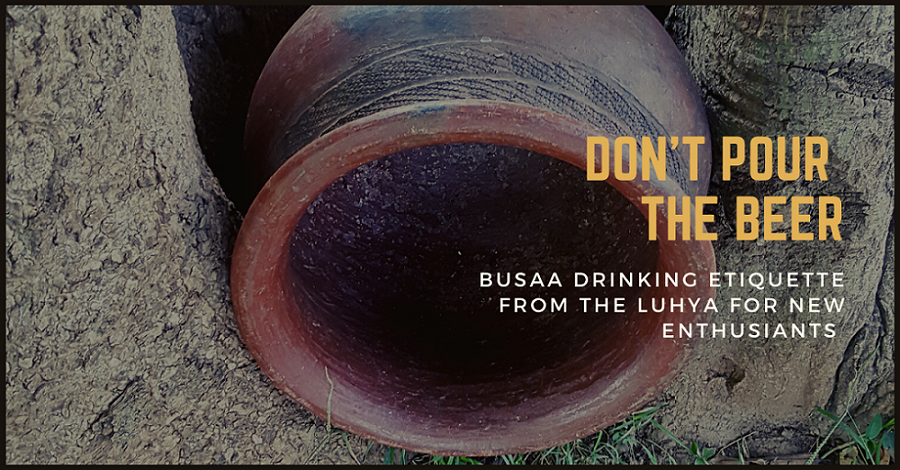The dos and dont’s when you get invited to a busaa drinking party in which the Luhya traditional straw (lusekhe)is used to sip beer. Busaa is a Luhya traditional beer. It is made from spontaneously fermented roasted grain known as kamakhalange or tsimbare, and the Luhya traditional yeast known as limela (lubukusu) or mumeri/ mamela (Isukha).
Next time you find yourself invited to this very important function in Bukusu land where busaa drinking is expected, we got your back. First things first; the Bukusu being the generous people they are, expect a crowd of people to receive you at the host’s home.
Busaa drinking etiquette: The preliminaries
When you arrive, the hosts and the people he invited will begin to sing and dance. Join them and showcase your dancing prowess. The more happy you are, the more joy you would radiate to the crowd thereby setting the mood for merrymaking. Remember to carry some loose cash on you in 100s or 50s and reward some of the good dancers. With this let me tell you, everyone will be happy to be associated with you.
After the welcome, there will be prayers and introductions. Introduce yourself fully. By this I mean to say, tell your hosts and associate hosts your clan, your mother’s clan, your grandmother’s clan, where you are married, the clan of your spouse, number of children and their gender etc. This elaborate introduction is meant to pull the antennae of any of your relatives who might be in the audience. You may also use this elaborate introduction as a conversation starter to keep conversations flowing.
Before the busaa drinking starts, expect to have some tea escorted with mandazi, groundnuts, bread, biscuits and such. When a Bukusu serves you tea, you will think this is the only meal you will be having for the day; wait until they start bringing the main meal and you will be wondering where you can borrow an extra stomach for all the food. Bukusus, and for that matter Luhyas, can kill you with food. But that is not a topic of discussion today. Let us talk about dos and dont’s when you get invited to a busaa drinking party using the traditional straw (lusekhe).
Recently or newly married husbands and those with one wife sit next to the door
It is a norm that all young men sit next to the door. The elderly males sit right inisde the hut. The reason for having young men sit at the door is for protection. Incase of invasion, the young men at the door will repulse the aggressor without disturbing beer drinking.
Second reason why young men, the newly married, or those with one wife sit at the door is also to avoid them spilling beer in case they get any bad news. The elder males are believed to have lived long enough and as such very few things can shake them. A young male, for example, may jump and dash in the process spilling the beer on hearing alarming news such as a child falling from a tree or his newly married wife, omwea, failed the mother-in-law simsim test.
Never pass above the lusekhe (mrija), bend or catch and pass on
When drinking busaa and you wish to leave the house for one reason or the other, there’s is a protocol to it. First, you need to inform the party of your intention to leave in due time. This is to allow fellow revellers an opportunity to prepare. As you may need to cross the path of lusekhe from the pot to the consumer, patience and decorum is expected of you.
Then you hand over your lusekhe to the person next to you. You then take, hold, pass and hand back the straw as you move along until you get to the door. You can alternatively bend and get out on your knees.
Nothing should also be passed on top of lusekhe. If for example you wish to hand a jacket to someone sited deep inside the house, you will hand it to the person right at the door, he will then pass it to the next person under the straw like that till it gets to the owner. This is done this way to avoid someone from mischievously poisoning the beer.
Lusekhe is a shared resource
Lusekhe is a shared resource. We don’t wipe it before or after using it. When we get a chance to drink in the same pot with anyone, it means we trust them. In the spirit of mulembe, we share the warmth of brotherhood with them. As we drink, we also share in their joys, pain and sorrows. Therefore, it is uncouth to do anything that could send the wrong signal. Case in point? Wiping lusekhe when it’s passed over to you to imbibe.
Women sit between husbands legs
Women are allowed to drink only when accompanied by their husbands. The women in this case are not allowed to sit on chairs like males. The women will sit on the floor besides thier husbands feet.
When they kama water or kamalwa don’t shake your busaa drinking straw
After drinking for awhile, say an 1 hour or so, the busaa will become dilute or even cool off. Busaa is taken warm for full flavor. There is usually a woman or a couple of women dedicated to the task of adding hot water to the drinking pot. The women will also add beer to the drinking pot on a need be basis.
Whenever the women come with hot water, they announce thier arrival. Those drinking should then stop shaking lusekhe till she completes her mission. The woman usually tops the drinking beer pot with water or more beer while kneeling as a sign of humility.
Shaking lusekhe when beer or water is being added communicates that you are disgusted or spiteful, looking down upon the host. Humility from the host has to be acknowledged, appreciated and reciprocated.

